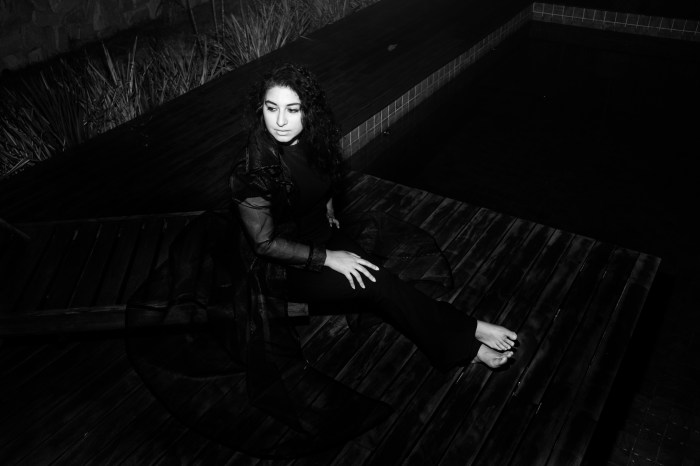THUNDER KNOCKING ON THE DOOR
What is most alarming about the new musical Thunder Knocking at the Door, is how soundly and easily many members of the audience seemed to sleep through the performance I attended, particularly the woman next to me who even snored…prodigiously. All of this even though the score for this new musical could only be called “rollicking,” mixing blues and rock and roll, and yet the show is still amazingly soporific.
Perhaps it’s the trite storyline; perhaps it’s that the vast majority of the lyrics are unintelligible as performed by the enthusiastic, if diction-challenged, cast. Mostly, though, it’s the show itself—a kind of latter day, blues-infused version of The Devil and Daniel Webster that fails to find any excitement—or even any logic.
The script is a clumsy patchwork drawing on the aforementioned chestnut, with a bit of Starmites, 110 in the Shade, and heaven knows what other formulaic musicals thrown in, not to mention echoes of medieval allegory plays. In fact, the entire undertaking seems so hackneyed and familiar, that it’s no wonder people nodded off within minutes of the opening number.
The story concerns a blues guitar player who beat a mysterious stranger, Marvell Thunder—hence the labored title—in a “cutting contest,” a kind of dueling blues guitar play-off. The guitar player subsequently died, leaving his two mythically created guitars to his children—a son and a daughter struck blind in an accident. Thunder later won the first of the guitars from the son, who went off in search of a career in rock and roll. Now, Thunder wants the other guitar and comes to the home of the daughter to try to win it in another cutting contest. Thunder is not of this world, as we gather through a series of heavy-handed scenes, though whether he is a saint or devil remains obscure. Meanwhile, the guitars in question have taken on an undefined but potent symbolism to the dead blues player’s former wife, who is seeing the blues player’s twin brother. When she discovers her son has lost the guitar, she tries to banish him from the house, but he never goes. Well, sometimes he does, propelled by hokey otherworldly forces wielded by Thunder, but he keeps coming back.
If these brief sentences are making your head swim, imagine what it’s like to see this played out in front of you over an hour. Now, I don’t have anything against occult tales or the supernatural. What I do object to is that very little of this makes any sense and one finds oneself whipsawed from plot point to plot point without any connection. In the end, it seems like a poor excuse to string some tuneful songs together, but given the lack of a cogent plot and the inability to understand the lyrics by Anderson Edwards, with additional lyrics by Keith Glover, who also wrote the book, the result is an excess of sound and motion and a dearth of entertainment.
The direction by Oskar Eustis has the kind of methodical pacing and predictability that were the show not so earnest would seem like camp. And the music by Keb Mo and Mr. Edwards is pretty standard rock or blues pastiche. Even the wonderful Leslie Uggams, who is in fine voice and does manage to make her lyrics understood, can’t seem to elevate this show above the confusing. Given these unfortunate events, you can’t really blame people for catching a few winks.
JUST US BOYS American Theatre of actors
314 W. 54th Street
Tues-Sat 8 pm; Sun 7 pm
$15 (212) 206-1515 Sometimes, one really wants a production to work. In the case of Just Us Boys, it’s the classic appeal of a backstage drama and a peek into the world of chorus boys. Unfortunately, if it’s as tedious and ordinary as what’s currently on stage at the American Theater of Actors, I guess I would just as soon see the show they’re all supposed to be in…and that’s called Depression! The Musical.
Playwright Frank Stancati did have a good idea, but he bogs it down in poor construction, predictable situations and stilted dialogue. As a result, most of the characters remain “types,” and the show is a series of vignettes that unfold over an indeterminate amount of time, though we assume it’s several months as the show goes from limping previews to a triumph at the Tony awards .
That said, there is charm in the fairly realistic, if shallow, presentation of some of the concerns in lives of chorus boys—making enough income, avoiding injury, not to mention personal drama—and Mr. Stancanti has caught the sense of a group of people thrown together who manage to bond and become a company.
The cast is a talented group of men that would easily be capable of more substantive material. As Anthony, the dance captain, Davis Kirby is the center of the piece. He has warmth and charm, as does Joe Gulla as his best friend, another seasoned gypsy. Ludis Schnore is the straight member of the chorus aching for a running role on a soap opera. He plays it with a winsome vacuity that seems dead on. Justin Greer plays Mike Lambert, a young dancer wrestling with both stage fright and his sexuality. It is the most fully developed character in the piece, and Mr. Greer does very well. Jeffrey Todd does a good job as the self-involved Joey, and all the men work well together.
The real challenge of the play is that it is a victim of its own structure. By virtue of the on and off stage life of the characters, the scenes are short and the character development not particularly sophisticated. Perhaps rewritten and expanded, this could make a good screenplay.
Christopher Byrne reports on business and lifestyle topics for a variety of publications in addition to covering theater for Gay City News. Reach him at chris@byrnecom.com.


































